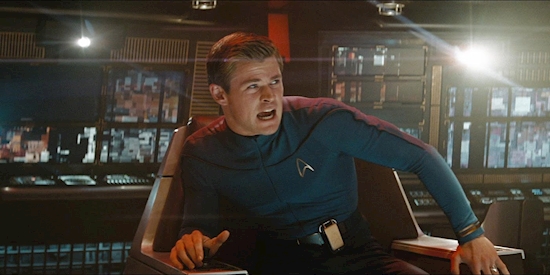The Reason Hemsworth Left Star Trek 4 Is What's Wrong With the Movies
After dropping out of a planned fourth Star Trek film last year, reported at the time as being due to salary disputes, Chris Hemsworth has since clarified why he turned down the offer to reprise his role as Captain James T. Kirk's father, George.
While promoting Men in Black: International, Hemsworth noted that his inclusion felt forced, as he believed that the production hadn't quite "landed on a reason to revisit [George's return]. I didn’t want to be underwhelmed by what I was going to bring to the table."
Hemsworth's comments and rationale for declining to return to the franchise that helped launch his career underscores the issue with continuing the iconic sci-fi franchise in the Kelvinverse established by filmmaker J.J. Abrams in 2009.
Click the button below to start this article in quick view. Start nowThe future of Star Trek isn't in the alternate timeline or on the big screen, with the franchise's prospects on television currently at their most promising. Hemsworth's presence in a sequel to Star Trek Beyond would be just as superfluous as the notion of a fourth film even being needed.
When Abrams rebooted the franchise by creating the divergent Kelvinverse timeline in 2009, Star Trek was coming off a prolonged period of inactivity, the likes of which hadn't been seen since the original series was cancelled in 1969.
The then-most recent film, Star Trek: Nemesis, served as the final film starring the cast of Star Trek: The Next Generation and failed to connect with audiences and critics alike upon its release in 2002, earning only $67.3 million at the worldwide box office and a critics score of 38% on Rotten Tomatoes.
Similarly, the then-most recent television series, Star Trek: Enterprise, had struggled to maintain its ratings during its entire four-season run and was largely lambasted by critics before its cancellation in 2005.
The franchise sorely needed a shot in the arm to ensure its survival and appeal to an entirely new generation of audiences. Under Abrams, the new films leaned more into sci-fi action than its more philosophical predecessors, featuring a younger, more vibrant cast while returning to the characters that had first introduced the franchise to audiences over 40 years prior. One of the first major characters seen on-screen in the 2009 reboot was Hemsworth's George Kirk.
Taking command of the USS Kelvin after the death of Captain Robau, George bought time for the crew, including his wife and infant son Jim, to escape from time traveling Romulans by ramming the Kelvin into the Romulan vessel, killing himself but severely damaging the advanced mining starship.
The events created a divergent timeline, resulting in a much more rebellious Kirk and the classic crew of the Enterprise coming together much sooner. The reboot was a runaway success and brought new life to the stagnant franchise, leading Paramount to commission sequels. However, the quality and originality would erode moving forward.
Four years after the reboot, Abrams returned to direct Star Trek Into Darkness, a loose retread of the original series episode "Space Seed" and its cinematic sequel, Star Trek II: The Wrath of Khan. The young crew of the Enterprise faced a resurgent Khan Noonan Singh and an interstellar conspiracy that reached the highest levels of Starfleet.
While successful at the box office, critics and audiences were put off by uninspired action and a recycled plot. As Abrams transitioned to work on the Star Wars franchise, he stepped into a producer role for Star Trek Beyond, with Justin Lin taking the directorial reins. Underperforming at the box office, the film's lukewarm reception commercially and critically had the studio begin to rethink the franchise's future.
To Hemsworth's point about the studio being unsure of where to go next and how his character would fit into a proposed fourth film, Paramount had at least two different versions of the sequel in development; one with director S.J. Clarkson and another based on an original story idea from filmmaker Quentin Tarantino, with Abrams returning to produce and Tarantino expected to helm the project.
The revelation that two potential sequels were being developed in tandem underscored that the studio wasn't necessarily aware of how best to proceed. These concerns were exacerbated when Clarkson departed her film, leading Paramount to shelve the franchise for the foreseeable future while Tarantino focused on his own upcoming film, Once Upon a Time in Hollywood.
With Star Trek's future booming on CBS All Access through the success of its original series, Star Trek: Discovery, the eagerly anticipated Star Trek: Picard and numerous future series in active development, the franchise is better suited for television.
Hemsworth's stated rationale for leaving Star Trek is well founded, as its big screen future remains unknown, with or without the surprise return of George Kirk and a cheap cash grab to capitalize on Hemsworth's heightened profile since 2009.
Source: www.cbr.com

